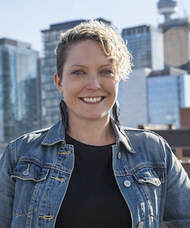Kelly Drennan looked past the bright lights and the runways of Toronto Fashion Week and was troubled by what she found.
Thousands of chairs wrapped in decorative paper. Plastic water bottles. Hairspray. And under it all, the message that it was time to clear out last season’s clothing and make way for something new.
It was 2006 and Drennan, who spent years doing public relations for the fashion industry, had just given birth to her second daughter. She’d also just seen the Al Gore documentary An Inconvenient Truth.
“I almost panicked,” she says about her reaction to that movie. “I thought, ‘what kind of a world are these two babies that I have going to be living in? And what can I do?’ ”
With that, her journey from a quietly environmentally conscious lifestyle to eco-fashion evangelism had begun.
In answer to her own question, Drennan got busy.
In 2007, she organized the first Green Gala, a wine-and-dine event showcasing designers who were exploring creative ways to make high-end clothing with minimal environmental harm. The gala grew into Fashion Takes Action (FTA), the non-profit Drennan founded to focus on sustainability in the fashion industry.
In the near decade since FTA began, it too has transformed: a significant part of its mission now includes conducting in-school education programs for grades 4 to 12, hosting an annual international ethical apparel conference and convening — with support from the Ontario Trillium Foundation — a roundtable looking at the broader issue of textile waste in that province.
During an interview with Drennan, one thing becomes clear: she’s far from done.
Drennan is one of the keynote speakers at the Davey Seminar, which takes place Nov. 5-6 in Edmonton, Alberta. Though this audience, coming from the oil, gas, mining and construction industries, is different from the groups she normally speaks to, the key message won’t change.
Her presentation will frame some of the larger issues from the fashion industry and will then go deeper into the topics of textile waste and recycling.
“It will be both what industry is doing to address these issues, what strategies are in place. And then on the other side, because everybody is a consumer at the end of the day, where our responsibility is as individuals.”
Drennan sees evidence that the fashion industry is taking steps forward: ethical sourcing, sustainable and regenerative materials, and more circular processes where textile waste finds new life as another product.
FTA’s Textile Diversion Lab, formally known as the Ontario Textile Diversion Collective, has an ultimate goal of eliminating textiles sent to landfills or incinerators. The collective has multiple stakeholders — textile collection agencies, industry, government, and municipalities that manage landfills and recycling programs — because, as Drennan says, this problem can’t be solved by any one sector.
“This isn’t just government’s responsibility; this isn’t just business’s responsibility; it isn’t just the civil society. It’s all of us working together,” she says.
“That’s how you change a system.”
The two babies who kickstarted Drennan’s journey into what is now her full-time job are heading into their teen years. She laughed when asked who is a tougher audience for her message — industry leaders or teenage girls.
The answer, she says, involves educating people to get them to change their habits.
Fashion Takes Action’s school program is the organization’s answer to tackling that with the younger generation. “We thought, let’s get our message across to youth before they’re consumers, before they develop these awful habits that we adults have.”
With adults, changing habits is a lot harder. But, Drennan says, it simply has to happen.
“As an industry, I just don’t think that we have a choice,” she says.
“We cannot continue to go about business in the same way. This is a new era. It’s critical.”
—
Therese Kehler is a freelance writer and editor based in Edmonton












